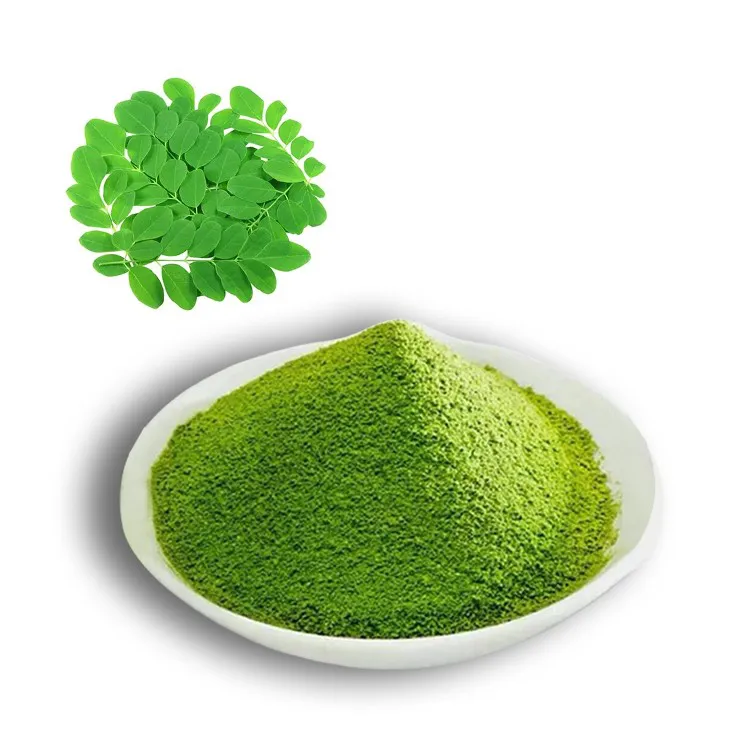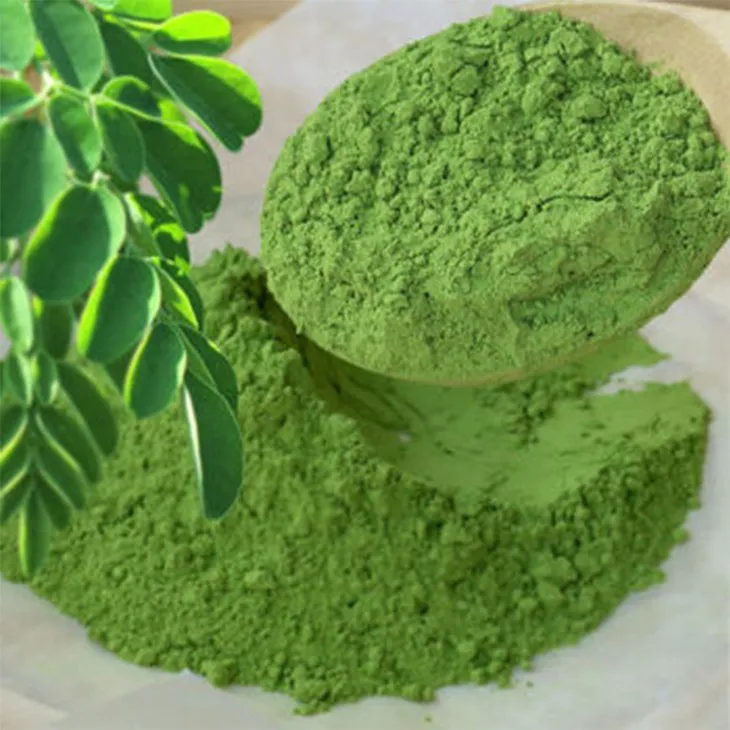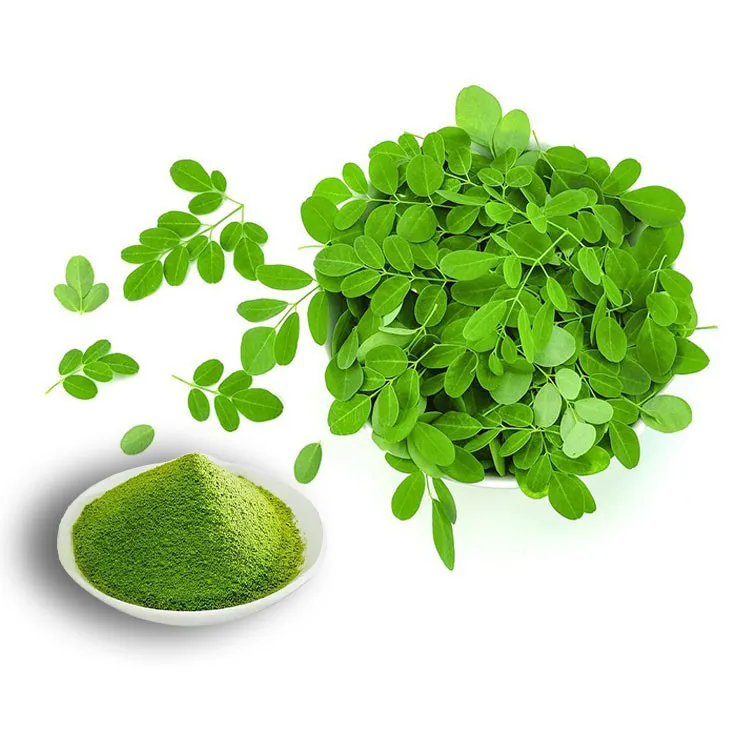- 0086-571-85302990
- sales@greenskybio.com
All about Moringa Powder.
2024-12-20

Introduction to Moringa powder
Moringa powder has been creating quite a stir in the health and nutrition community. This remarkable powder is obtained from the Moringa oleifera tree, which has its origins in certain parts of Africa and Asia. The Moringa oleifera tree is often referred to as the "miracle tree" due to the numerous health benefits associated with its various parts, and the powder form has become increasingly popular as a dietary supplement.

Nutritional Profile of Moringa powder
Moringa powder is a veritable treasure trove of nutrients.
Vitamins
It is rich in vitamins such as vitamin A, vitamin C, and vitamin E. Vitamin A is essential for maintaining good vision, healthy skin, and a strong immune system. Vitamin C is a well - known antioxidant that helps in collagen synthesis and boosts the immune system. Vitamin E also has antioxidant properties, protecting cells from damage caused by free radicals.
Minerals
The powder contains an abundance of minerals like calcium, potassium, and iron. Calcium is crucial for bone health, ensuring the strength and density of bones. Potassium is important for muscle function, helping muscles contract and relax properly. Iron is necessary for the production of hemoglobin in red blood cells, which is responsible for transporting oxygen throughout the body, thereby playing a vital role in maintaining good blood circulation.
Protein
One of the notable features of moringa powder is its high protein content. For vegetarians and vegans, it serves as an excellent plant - based protein option. Protein is essential for building and repairing tissues, as well as for the production of enzymes and hormones.
Fiber
Another beneficial component is its fiber content. Fiber is important for digestion as it helps to keep the digestive system running smoothly. It can add bulk to the stool, preventing constipation and promoting regular bowel movements.

Health Benefits of Moringa Powder
Antioxidant Properties
The presence of vitamins A, C, and E gives moringa powder strong antioxidant capabilities. Antioxidants play a crucial role in the body by neutralizing free radicals. Free radicals are unstable molecules that can cause damage to cells, DNA, and proteins. By combating these free radicals, moringa powder may help in reducing the risk of chronic diseases such as cancer, heart disease, and neurodegenerative disorders.
Bone Health
Thanks to its calcium content, moringa powder can contribute to better bone health. Adequate calcium intake is necessary throughout life, especially as we age, to prevent osteoporosis and maintain the integrity of the skeletal system. In addition to calcium, other nutrients in moringa powder may also play a role in promoting bone health, such as vitamin D (which may be present in small amounts) and potassium, which helps in maintaining the right balance of minerals in the body.
Muscle Function
Potassium, a key mineral in moringa powder, is vital for proper muscle function. It helps in the transmission of nerve impulses that are necessary for muscle contraction and relaxation. Athletes and those who engage in regular physical activity may find moringa powder beneficial as it can support muscle performance and recovery.
Blood Circulation
The iron in moringa powder is essential for the production of hemoglobin, which is directly related to good blood circulation. Adequate iron levels ensure that red blood cells can efficiently carry oxygen to all parts of the body. This not only provides energy but also helps in maintaining the overall health of organs and tissues.
Digestion
As mentioned earlier, the fiber content in moringa powder is beneficial for digestion. It can help in regulating the digestive process, from the breakdown of food in the stomach to the absorption of nutrients in the small intestine and the elimination of waste in the large intestine. Moreover, it may also support the growth of beneficial gut bacteria, which are important for a healthy digestive tract.
Blood Sugar Regulation
There is some evidence to suggest that moringa powder may play a role in blood sugar regulation. It may help in improving insulin sensitivity, which means that the body can more effectively use insulin to regulate blood sugar levels. For individuals with diabetes or those at risk of developing diabetes, this could be an important aspect of incorporating moringa powder into their diet.

Ways to Incorporate Moringa Powder into Your Diet
Moringa powder is incredibly versatile and can be easily incorporated into a variety of dishes and beverages.
Smoothies
One of the most popular ways to consume moringa powder is by adding it to smoothies. You can blend it with fruits such as bananas, berries, and mangoes, along with some yogurt or plant - based milk. This creates a delicious and nutritious drink that can be enjoyed for breakfast or as a post - workout snack.
Salads
Sprinkling moringa powder on salads is another simple yet effective way to include it in your diet. Whether it's a green salad, a fruit salad, or a more elaborate salad with grains and vegetables, a small amount of moringa powder can add a nutritional boost.
Cooking
Moringa powder can also be used in cooking. It can be added to soups, stews, and sauces, enhancing both the flavor and the nutritional value. For example, you can add a teaspoon or two of moringa powder to your favorite vegetable soup or pasta sauce.
Baking
For those who enjoy baking, moringa powder can be incorporated into baked goods such as muffins, bread, and cookies. However, it's important to note that when using it in baking, it may slightly alter the taste and texture of the final product.
Precautions and Considerations
While moringa powder offers many potential health benefits, there are some precautions and considerations to keep in mind.
Pregnancy and Breastfeeding
Although moringa has been used in traditional medicine in some cultures during pregnancy and breastfeeding, it's advisable to consult a healthcare provider before using moringa powder during these periods. Some studies suggest that high doses may have potential effects on the developing fetus or nursing infant.
Medication Interactions
Moringa powder may interact with certain medications. For example, it may affect the absorption or effectiveness of drugs used to treat diabetes or high blood pressure. If you are taking any medications, it's crucial to talk to your doctor before starting to use moringa powder regularly.
Allergies
Some individuals may be allergic to moringa. Allergic reactions can range from mild symptoms such as itching and rash to more severe reactions like difficulty breathing. If you have a known allergy to plants in the Moringaceae family or have had an allergic reaction to moringa in the past, it's best to avoid using moringa powder.
Conclusion
In conclusion, moringa powder is a superfood that offers a wide range of nutritional benefits. From its rich nutrient profile, including vitamins, minerals, protein, and fiber, to its potential health benefits such as antioxidant properties, support for bone health, muscle function, blood circulation, digestion, and blood sugar regulation, it has much to offer. Its versatility in use makes it an easy addition to various diets. However, it's important to be aware of the precautions and considerations, especially when it comes to pregnancy, breastfeeding, medication interactions, and allergies. By understanding these aspects, individuals can make informed decisions about whether and how to incorporate moringa powder into their daily lives for the pursuit of better health.
FAQ:
What are the main nutrients in Moringa powder?
Moringa powder is rich in vitamins such as vitamin A, C, and E, which provide antioxidant properties. It also contains minerals like calcium, potassium, and iron. Moreover, it has a high protein content and fiber.
Why is Moringa powder a good option for vegetarians and vegans?
Because it has a high protein content, it can be a great plant - based protein source for vegetarians and vegans.
How can Moringa powder be used?
It is very versatile. It can be added to smoothies, sprinkled on salads or used in cooking.
What are the potential benefits of Moringa powder for digestion?
Due to its fiber content, it may have potential benefits for digestion.
Can Moringa powder help regulate blood sugar levels?
It may help in regulating blood sugar levels.
Related literature
- The Nutritional and Medicinal Properties of Moringa oleifera: A Review"
- "Moringa oleifera: A Multifunctional Tree with High - Value Products"
- "Health - Promoting Properties of Moringa oleifera: A Comprehensive Review"
- ▶ Hesperidin
- ▶ citrus bioflavonoids
- ▶ plant extract
- ▶ lycopene
- ▶ Diosmin
- ▶ Grape seed extract
- ▶ Sea buckthorn Juice Powder
- ▶ Beetroot powder
- ▶ Hops Extract
- ▶ Artichoke Extract
- ▶ Reishi mushroom extract
- ▶ Astaxanthin
- ▶ Green Tea Extract
- ▶ Curcumin Extract
- ▶ Horse Chestnut Extract
- ▶ Other Problems
- ▶ Boswellia Serrata Extract
- ▶ Resveratrol Extract
- ▶ Marigold Extract
- ▶ Grape Leaf Extract
- ▶ blog3
- ▶ blog4
- ▶ blog5
-
Coconut Water Powder
2024-12-20
-
Yam Extract
2024-12-20
-
Milk Thistle Extract
2024-12-20
-
Natural grape seed extract
2024-12-20
-
Tamarind extract powder
2024-12-20
-
Lemon Juice Powder
2024-12-20
-
Pomegranate Extract
2024-12-20
-
Berberis aristata Extract
2024-12-20
-
Dan Shen Root Extract/Salvia Root Extract
2024-12-20
-
Golden Seal Extract
2024-12-20





















